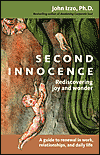
I was asked "Do you believe in miracles?" and it occurred to me that no one had asked me that question since my days in ministry. I was taken aback. Did I believe in people being spontaneously cured of cancer, virgin births, raising of the dead, parting of seas, burning bushes, and so on? Did I believe in serendipity, synchronicity, and moments of seeming happenstance that wind up being instrumental to our path?
At one time, most of us believed in miracles just as we believed in "magic." Surely part of our childhood innocence was recognizing and appreciating the wonderful serendipity that seemed to exist in the world around us. Most of us believed in miracles when we were children, but now that I am a (sometimes) grumpy middle-aged man, long past the innocence of youth, how would I answer the question: Do I believe in miracles?
What is a miracle anyway? A working definition might go something like this: An event out of the ordinary, an event that is unique, something that defies our logic and causes us to feel awe and wonder. A miracle is, above all, something we simply cannot explain, but that somehow gives us hope.
Before You Decide...
Before you decide whether you believe in miracles, think about this for a moment: We live on a tiny planet rotating around a massive hydrogen-fusion reactor with other planets. It's known as the solar system. That's right -- the sun is not a fluorescent light in the sky, it is one absolutely enormous hydrogen reaction. It travels (yes, our entire solar system moves) through a galaxy which itself moves within a possibly infinite and ever-expanding universe. Surrounding us appears to be a lifeless void. A few microbes here and there, perhaps, but mostly rock, gas, chemical reactions, and a void with no living (let alone sentient) objects as we know them.
Look at our tiny planet from space and you see a beautiful blue sphere hung like an ornament in the vast blackness, so fragile, so alone. Astronauts have all spoken of this sudden realization when for the first time they see our world for what it really is. Come in closer and you find a planet teeming with life, from microscopic organisms to sentient beings such as ourselves who, on our best days, have deep conversations about the meaning of the universe. And how did this tiny planet come to be so fortunate? And what of the incessant manner in which life breeds more life and keeps the cycle going?
Amazement Abounds
Stepping back from the "big stuff," it seems to me that there are hints of the miraculous everywhere. We had a cat once named Nulla who became pregnant. My wife, a nurse by personality as well as formal training, knew the cat was pregnant. How she knew this, I really have no idea. A few months later we were watching television and Nulla started to breathe heavily and came to lie next to my wife on the sofa. Somehow the cat knew that this was a fellow female, a fellow giver of life. "Stand aside, male one," Nulla seemed to be saying with her nudges. "This is women's work!" She crawled upon my wife's lap and began her journey to bear her young.
Over the next hour on my wife's lap, our curious children watched in amazement as she pushed out her kittens one by one. Each one entered the world wet and with a small meow and team of thankful onlookers. Then somehow, when the work was done, she shepherded them into a corner and lay beside them to provide warmth and sustenance. She had never seen this, never learned it in some book or been taught it by her own mother. But still she ensured the cycle was unbroken. How did this happen?
I know all about cell division and about natural selection and evolutionary principles. I am sure someone smarter than myself can create a linear trail of logic and events to explain Nulla's ability, desire, and compulsion to keep the cycle going. But deep inside I know that nothing in my logical conjectures will ever be sufficient to explain the awe I feel in the presence of such innate knowing.
Serendipity: When Events Become Miracles
And then there is this thing some people call serendipity, the intersection of things that somehow brings together events in a way that inspires hope and reminds us of unseen hands that seem to guide us.
My oldest daughter is adopted. My ex-wife and I picked her up from a hospital in Columbus, Ohio, when she was three days old. When she was three weeks old, we moved to San Diego, California, to start a new assignment.
We had both wanted children very badly and had been unable to conceive one of our own. Unfortunately, we had been struggling with our marriage for many years and when we moved to California our problems came to a head and we decided that it was time to part ways. The decision to split came when our daughter was six months old and our adoption of her just one month from being finalized.
We had both wanted children all our lives and each of us loved our daughter very much. We also knew that a divorce would not sit well with the adoption agency; it would likely mean we would lose her. For several weeks we agonized about what to do and, to my shame, we decided to lie, to tell the agency that we were still together until the adoption was final. When they called, we would say all was well. That very day we made this decision, my phone got shut off for some unexplained reason. Just shut right down, no longer in service.
I called the phone company to ask why and was told the company had "no idea, just a mistake -- we'll put it back on in the morning." That night a tiny voice kept telling me that we had made the wrong decision and I told my wife that we had to tell them the truth. Whatever the cost, integrity was even more important than keeping our daughter. We would simply tell the agency that we loved her and would love to keep her even as single parents.
At 8:30 the next morning, the phone rang and my wife answered it. It was the adoption agency "just calling to check in."
My wife said, "Well, to tell the truth, things have been a little tough. John and I have been struggling for several years now and have decided that we need to split up. We know that is not good news, but we love Lena very much and would like to keep her anyway."
On the other end of the phone there was an eternity of silence. Then the woman from the agency said these words: "We heard through an anonymous caller two days ago that you two were getting a divorce. We made a decision inside the agency that we would call you and if you told us the truth we would try to help you. But if you lied we would take Lena back. I am so glad you told me the truth." Then she added: "I tried to call you all day yesterday, but your phone was disconnected." And I know, without even the hint of a shadow of a doubt, that had the phone been working that day, we would have lied.
In twenty-five years of having phone service, the phone company had never cut off my service except on the one day in all those years that it would have made a difference. Two months later we adopted Lena, and although my former wife and I have lived apart for fifteen years, she has two sets of parents who love her completely and utterly. Was this a miracle? I don't know -- but I can't explain it, it did give me hope and it changed many lives.
And there have been other incidents like that; and times when I longed for a miracle and it did not come. Neither of which I can explain.
The Scientific Possibility of Miracles
Some years ago astronomers began using supercomputers to calculate the odds of there being life similar to ours elsewhere in the universe. We humans have always been fascinated with the idea of life on other worlds, of extraterrestrials. The scientists calculated the number of galaxies, the number of stars, the number of those stars likely to have planets; on and on the calculations went until they came up with the mathematical probability that life exists elsewhere. The good news is that the computer says that although very rare, there must be many other places where life has evolved as it did here on Earth. We are not so extraordinary after all.
These scientists and their colleagues started listening with giant telescopes (stuff I don't really comprehend). Using these gigantic ears, they began listening for what those other beings might be saying to us from across the universe. They were sure we would hear them, a radio signal, a television transmission, something that seemed out of the ordinary. They have been listening for more than a decade. What have they heard? Nothing. That's right -- not a peep. Not even the hint of the possibility of a peep.
So they began to hypothesize (I have a Ph.D. and that is what we researchers do -- we hypothesize). When we don't get the answer we expect, we look for explanations. No conclusions, not yet, but a few sobering ideas. The first hypothesis is that intelligent life does not last very long once it evolves. That is, life may have sprung up many times throughout history but, in cosmic terms, intelligent life does not hang around. Maybe civilizations blow themselves up or mess up their planet until it is unable to support the intelligent life it spawned. Who knows why, but there are plenty of possible reasons they don't hang around long enough for us to hear them. Maybe, at this given moment, we are alone. Some future civilization may listen, just as we are, but they too will hear nothing. We will have long ago snuffed ourselves out.
There is a competing theory -- perhaps more sobering and awe-inspiring at the same time -- that the computers may be wrong. Perhaps life is even more rare than the computer models suggest.
How might that be? Well, contemplate a few simple facts. A planet has to be within its star's small zone between too much heat and too much cold. Otherwise liquid water cannot exist, something that is essential for life as we know it. So fragile is this tiny oasis of life on Earth that if we were one degree closer to the Sun we would burn up, one degree farther away, we would freeze to death. Comets can shake and shred planets -- and not just once. Bombardments from space debris can go on a very long time. For life similar to our own to exist, a world must have a similar geography and composition to the Earth's. Most planets so far detected around other stars have been massive gas giants, probably with no solid surface at all. There are many "serendipitous" occurrences that led to human beings evolving on this planet; but there is no reason for life on other worlds to develop along similar lines.
There is only one place in the universe where we know life exists, filled with sentient beings. Look around you: It's here.
Do I Believe in Miracles?
So do I believe in miracles? Well, if a miracle is an extraordinary event that we cannot explain, I think we are surrounded by and living a miracle. I think the fact that I am writing this and you are pondering where you stand on the matter is a miracle. I think the fact that Nulla (and my wife) have both given birth to new life and kept the life cycle going is extraordinary. I believe that one day twenty-five years ago, grace, God or something extraordinary turned my phone off. I think the fact that this green and blue splendor floats through an otherwise deathly quiet universe is a pretty extraordinary thing. In light of the sheer wonder that we exist at all, spontaneous cures of cancer and the occasional parting of a sea are pretty unspectacular and not really worth my time to dismiss.
Maybe we are so surrounded by miracles that we start to miss them, to take them for granted. And maybe, just maybe, life would be very different, and more profoundly good, if we thought about it more often and remembered how miraculous it all is. Perhaps it is a good thing to ponder, to recognize that at this one moment in time, we may be the only ones in the entire infinite universe experiencing this miracle and the only intelligence pondering its deeper meaning.
Perhaps then we would start treating it all with just a little more respect, a little more care, a shade more awe, and maybe the miracles will keep happening.
Do I believe in miracles? Deep inside of me there is an innocent child who takes an honest look at this thing called life and simply says: Of course. And I think we ought to trust that part of us a lot more than we do, which is probably part of what second innocence is all about.
Reprinted with permission of the publisher,
Berrett-Koehlar Publishers, Inc.
©2004. www.bkconnection.com
Article Source:
Second Innocence: Rediscovering Joy and Wonder: A Guide to Renewal in Work, Relationships, and Daily Life
by John B. Izzo.
 John Izzo's concept of ""second innocence"" means recovering those feelings of enthusiasm, faith, presence, and curiosity associated with childhood and blending them with the knowledge and experience of adulthood. Through a series of compelling stories, he offers a collection of uncommon thoughts on common themes. the author's experience as a minister, teacher, author, corporate advisor, and leader of spiritual retreats provides a wealth of wisdom for this journey.
John Izzo's concept of ""second innocence"" means recovering those feelings of enthusiasm, faith, presence, and curiosity associated with childhood and blending them with the knowledge and experience of adulthood. Through a series of compelling stories, he offers a collection of uncommon thoughts on common themes. the author's experience as a minister, teacher, author, corporate advisor, and leader of spiritual retreats provides a wealth of wisdom for this journey.
Click here for more info and/or to order this book and/or download the Kindle edition.
About the Author
 Dr. Izzo has served on the faculties of two major universities. His opinions, research, and expertise have been widely published and featured in media including Fast Company, CNN, Wisdom Network, Canada- AM, ABC World News, The Wall Street Journal, The New York Times, The Globe and Mail, and the National Post. His clients include Kaiser Permanente, Mayo Clinic, Fairmont Hotels, Astra Zeneca, Coca-Cola, Hewlett-Packard, IBM, Toys R Us, Verizon, Duke Energy, and the Department of National Defense. Visit his website at http://www.drjohnizzo.com/
Dr. Izzo has served on the faculties of two major universities. His opinions, research, and expertise have been widely published and featured in media including Fast Company, CNN, Wisdom Network, Canada- AM, ABC World News, The Wall Street Journal, The New York Times, The Globe and Mail, and the National Post. His clients include Kaiser Permanente, Mayo Clinic, Fairmont Hotels, Astra Zeneca, Coca-Cola, Hewlett-Packard, IBM, Toys R Us, Verizon, Duke Energy, and the Department of National Defense. Visit his website at http://www.drjohnizzo.com/
Books by this Author
at InnerSelf Market and Amazon





























